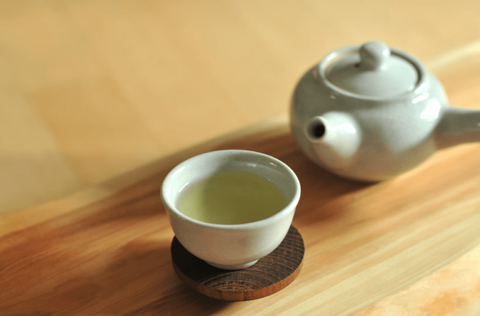Green tea is considered one of the healthiest beverages on the planet. It's high in antioxidants, which may assist with a variety of issues including better brain function, fat loss, cancer prevention, and heart disease prevention.
There may be even more health advantages to be discovered. Green tea contains a wealth of beneficial bioactive chemicals.
It might help your brain function more effectively
Green tea can improve your brain's performance. Green tea does more than simply keep you alert; it may also assist enhance brain function.
Caffeine, a well-known stimulant, is the key active ingredient. It doesn't contain as much caffeine as coffee does, but it's enough to cause a response without producing the unpleasant jitteriness produced by taking in too much caffeine.
Caffeine works by blocking adenosine, an inhibitory neurotransmitter. As a result, it boosts the activity of neurons and the concentration of such neurotransmitters as dopamine and norepinephrine.
Caffeine has been found in studies to boost various aspects of brain function, including mood, attention, reaction time, and memory.
Green tea, on the other hand, contains a number of brain-boosting chemicals, including caffeine. It also includes amino acid L-theanine, which is capable of crossing the blood-brain barrier.
L-theanine activates the inhibitory neurotransmitter GABA, which has anti-anxiety effects. It also boosts dopamine and alpha brain activity.
Caffeine and L-theanine have been shown to have a synergy. This implies that the combination of the two may produce particularly potent effects on brain function.
Green tea may provide you with a considerably milder and different type of buzz than coffee due to the L-theanine and tiny amount of caffeine.
When compared to coffee, many individuals claim that drinking green tea gives them more consistent energy and increases their productivity.
In Short
Green tea contains about half the quantity of caffeine as coffee, but it is enough to have an effect. Green tea also includes the amino acid L-theanine, which can work in tandem with caffeine to enhance brain function.

It may assist to prevent brain degeneration.
Green tea may help your brain function better in the short term and protect it against aging.
Alzheimer's disease is a prevalent neurodegenerative disease that affects seniors the most frequently.
Another frequent neurodegenerative illness is Parkinson's disease, in which the death of dopamine-producing neurons in the brain causes tremors and shuffling.
Green tea catechins have been found to have neuroprotective properties in test tubes and animal models, suggesting that they may lower the risk of dementia.
In Short
Green tea's active components may benefit the brain in a variety of ways. They might decrease the incidence of dementia, a prevalent neurodegenerative disease among older persons.
It may also assist you in reducing weight
Given that green tea may increase metabolism in the short term, it's reasonable to think it might assist you in dropping weight.
Green tea has been shown in numerous studies to help reduce body fat, particularly around the waist. A 12-week randomized controlled trial with 240 persons who were overweight was one of these studies.
In this study, subjects who took green tea had significant decreases in body fat percentage, weight, waist circumference, and belly fat when compared to those who did not.
However, some research have failed to show a statistically significant weight reduction with green tea, necessitating further study.
In Short
Green tea has been linked to weight reduction in several studies. It may be particularly beneficial for reducing dangerous abdominal fat.
Contain bioactives that are good for you
The leaves of the green tea plant, when processed, provide the finished product. Tea is high in polyphenols, which are natural chemicals that have health-related benefits including inflammation reduction and cancer prevention.
Epigallocatechin-3-gallate (EGCG) is a catechin present in green tea. Catechins are antioxidants that aid in the prevention of cell damage and offer other health benefits.
Antioxidants are chemical compounds that fight the formation of free radicals, which may cause harm to cells and molecules. These free radicals play a role in aging and a variety of ailments.
Catechin, a polyphenol in green tea, has been found to be one of the most powerful. Its capacity to help cure various illnesses has been evaluated in studies. It appears to be one of the main components that contribute to green tea's healing abilities.
Green tea also contains minor amounts of minerals that may benefit your health. Choose a higher quality brand to minimize the amount of fluoride in your green tea. Even if you opt for a less-expensive variety, the advantages more than outweigh any danger.
In Short
Green tea is high in polyphenol antioxidants, including the catechin EGCG. These antioxidants may have a number of health benefits.
Increased fat burning occurs
Green tea contains catechins, which are responsible for fat burning. If you examine the list of ingredients for any fat-burning pill, you'll almost certainly find green tea there.
Green tea can improve fat burning and raise metabolic rate, according to studies.
Green tea extract increased the number of calories burned by 4% in one research involving 10 healthy men. Green tea extract improved fat oxidation by 17% compared with those taking a placebo in another study involving 12 healthy men.
However, some studies on green tea do not show a significant increase in metabolism, which suggests that the effects may be dependent on the individual and how the study was conducted.
Caffeine may also aid in the mobilization of fatty acids from fat tissue and their use as energy by increasing physical performance.
Caffeine may improve physical performance by 11–12 percent, according to two separate review papers.
In Short
In the short term, green tea may raise metabolic rate and encourage fat burning. Although some research disputes this, antioxidants may decrease the chance of certain malignancies.

It might help you live longer
Given that certain components in green tea may help prevent cancer and heart disease, it's reasonable to assume that it might aid in your longevity.
Researchers investigated 40,530 Japanese adults for 11 years in one research. Those who drank the most green tea — 5 or more cups per day — had a significantly reduced risk of dying during the study period.
The risk of death from all causes was reduced by 23% percent in women and 12% percent in men. The risk of dying from heart disease was 31% lower in women and 22% lower in men. The chance of dying from a stroke decreased by 42%, while the corresponding figures for males were 35%.
Green tea consumption was found to be beneficial in a study of 14,001 older Japanese people, who were 76 percent less likely to die during the 6-year follow-up period.
In Short
People who drink green tea may live longer than those who don't, according to studies.
Antioxidants have been linked to a decreased incidence of some cancers
Cancers are caused by uncontrolled cell development. It is one of the world's major causes of death. Oxidative damage has been linked to chronic inflammation, which can lead to chronic illnesses including cancers. Antioxidants may aid in the prevention of oxidative injury.
Green tea is a rich source of antioxidant compounds. The following research has linked green tea components to reduced incidence of cancer:
Green tea may lower the chance of getting breast cancer. According to a comprehensive look at observational research, women who consumed the most green tea had a 20–30 percent reduced risk of developing breast cancer, one of the most prevalent female cancers.
Prostate cancer. Men who drank green tea had a decreased risk of advanced prostate cancer, according to one study.
Green tea is beneficial for the digestive system. It may protect against colorectal cancer, according to a study of 29 research papers.
While some research finds that people who drink green tea are less likely to develop various types of cancer, more high-quality studies are needed to confirm these outcomes.
To get the most health advantages, don't consume milk along with your tea. It may reduce the antioxidant activity in certain teas, according to some research. Avoid adding milk to your tea for maximum health benefits.
In Short
Green tea contains antioxidants that may help prevent cancer. Green tea drinkers are less likely to develop various types of cancer, according to several studies.
It may help reduce bad breath
Green tea's antioxidants, particularly EGCG and QQQ, may help reduce foul breath.
Catechins may help prevent bacterial infections by suppressing their growth, according to test tube studies. It is a common bacteria in the mouth that causes plaque development and contributes to tooth decay and cavities.
Green tea contains catechins, which have been found in studies to hinder the growth of oral germs in the lab. However, there is no evidence that drinking green tea has similar effects. Green tea, on the other hand, might help to reduce bad breath.
In Short
Green tea catechins might prevent bacteria from growing in the mouth, reducing the likelihood of odors.
It may prevent type 2 diabetes
Type 2 diabetes is a disease in which the pancreas no longer produces enough insulin, causing glucose to accumulate in your blood. Type 2 diabetes affects around 1% of people worldwide..
Insulin resistance, or the inability to produce insulin, is one of the causes of Type 2 diabetes. Green tea has been shown in studies to improve insulin sensitivity and lower blood sugar levels.
According to one research in Japanese people, those who drank the greenest tea had an approximately 42% reduced risk of type 2 diabetes.
Tea drinkers had a 18% lower chance of developing diabetes according to a review of seven studies with a total of 286,701 participants.
In Short
Green tea has been shown to cause mild decreases in blood sugar levels in controlled studies. It may also lower the chance of developing diabetes.
It may aid in the prevention of heart disease.
Heart disease and stroke are the most common causes of death worldwide, accounting for more than a third of all fatalities.
Green tea has been shown in studies to help reduce several of the major risk factors for these conditions, such as lowering total cholesterol and LDL (bad) cholesterol levels.
The antioxidant capacity of the blood is also improved by green tea, which protects LDL particles from oxidation and one step on the road to heart disease. Given the health benefits seen with green tea consumption, it's not surprising that participants who drink it have a 31% decreased chance of dying from a cardiovascular illness.
In Short
Green tea has been shown to reduce total and LDL (bad) cholesterol levels, as well as protect LDL particles from oxidation. People who drink green tea have a reduced chance of cardiovascular disease, according to studies.
In Conlusion
Green tea may provide a variety of health advantages. You might want to consider incorporating green tea into your routine in order to feel better, lose weight, and reduce your risk of chronic illness.



